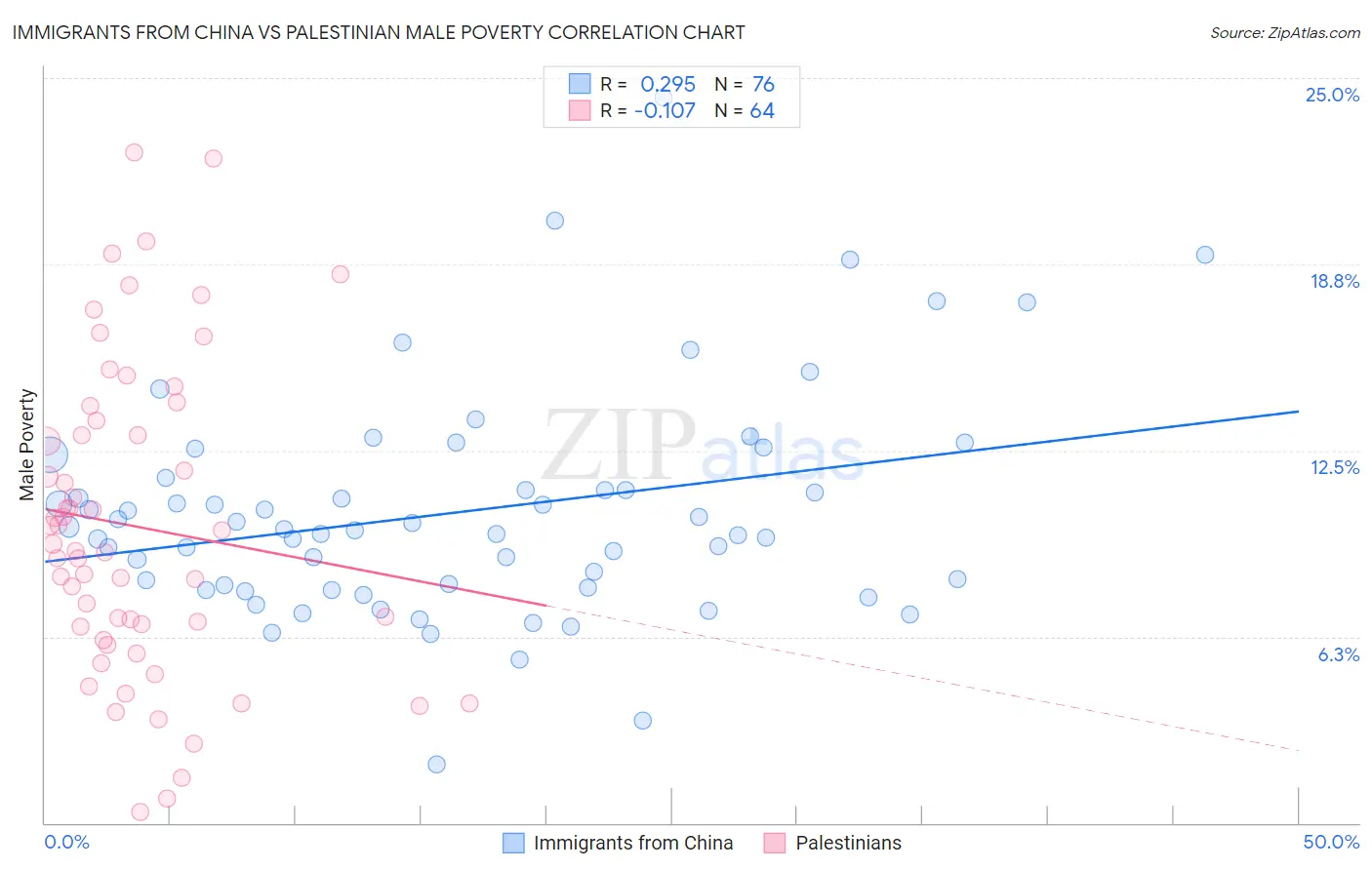Immigrants from China vs Palestinian Male Poverty
COMPARE
Immigrants from China
Palestinian
Male Poverty
Male Poverty Comparison
Immigrants from China
Palestinians
10.7%
MALE POVERTY
87.1/ 100
METRIC RATING
120th/ 347
METRIC RANK
10.6%
MALE POVERTY
89.1/ 100
METRIC RATING
113th/ 347
METRIC RANK
Immigrants from China vs Palestinian Male Poverty Correlation Chart
The statistical analysis conducted on geographies consisting of 456,181,421 people shows a weak positive correlation between the proportion of Immigrants from China and poverty level among males in the United States with a correlation coefficient (R) of 0.295 and weighted average of 10.7%. Similarly, the statistical analysis conducted on geographies consisting of 216,357,204 people shows a poor negative correlation between the proportion of Palestinians and poverty level among males in the United States with a correlation coefficient (R) of -0.107 and weighted average of 10.6%, a difference of 0.48%.

Male Poverty Correlation Summary
| Measurement | Immigrants from China | Palestinian |
| Minimum | 1.9% | 0.38% |
| Maximum | 24.3% | 22.5% |
| Range | 22.4% | 22.1% |
| Mean | 10.4% | 9.9% |
| Median | 9.8% | 9.2% |
| Interquartile 25% (IQ1) | 7.9% | 6.3% |
| Interquartile 75% (IQ3) | 11.4% | 13.3% |
| Interquartile Range (IQR) | 3.4% | 6.9% |
| Standard Deviation (Sample) | 3.7% | 5.2% |
| Standard Deviation (Population) | 3.7% | 5.2% |
Demographics Similar to Immigrants from China and Palestinians by Male Poverty
In terms of male poverty, the demographic groups most similar to Immigrants from China are Peruvian (10.7%, a difference of 0.010%), Native Hawaiian (10.7%, a difference of 0.030%), South African (10.7%, a difference of 0.070%), Immigrants from Hungary (10.7%, a difference of 0.10%), and French (10.7%, a difference of 0.10%). Similarly, the demographic groups most similar to Palestinians are Immigrants from Brazil (10.6%, a difference of 0.020%), Immigrants from Turkey (10.6%, a difference of 0.10%), Immigrants from Russia (10.6%, a difference of 0.14%), Immigrants from Argentina (10.6%, a difference of 0.18%), and Sri Lankan (10.6%, a difference of 0.25%).
| Demographics | Rating | Rank | Male Poverty |
| Immigrants | Southern Europe | 91.3 /100 | #106 | Exceptional 10.5% |
| Laotians | 91.2 /100 | #107 | Exceptional 10.5% |
| Portuguese | 91.0 /100 | #108 | Exceptional 10.6% |
| Albanians | 90.6 /100 | #109 | Exceptional 10.6% |
| Argentineans | 90.1 /100 | #110 | Exceptional 10.6% |
| Immigrants | Argentina | 89.8 /100 | #111 | Excellent 10.6% |
| Immigrants | Turkey | 89.5 /100 | #112 | Excellent 10.6% |
| Palestinians | 89.1 /100 | #113 | Excellent 10.6% |
| Immigrants | Brazil | 89.0 /100 | #114 | Excellent 10.6% |
| Immigrants | Russia | 88.6 /100 | #115 | Excellent 10.6% |
| Sri Lankans | 88.1 /100 | #116 | Excellent 10.6% |
| Immigrants | South Eastern Asia | 88.1 /100 | #117 | Excellent 10.6% |
| Okinawans | 87.6 /100 | #118 | Excellent 10.7% |
| Immigrants | Hungary | 87.6 /100 | #119 | Excellent 10.7% |
| Immigrants | China | 87.1 /100 | #120 | Excellent 10.7% |
| Peruvians | 87.1 /100 | #121 | Excellent 10.7% |
| Native Hawaiians | 87.0 /100 | #122 | Excellent 10.7% |
| South Africans | 86.8 /100 | #123 | Excellent 10.7% |
| French | 86.7 /100 | #124 | Excellent 10.7% |
| Immigrants | Norway | 86.0 /100 | #125 | Excellent 10.7% |
| Immigrants | Ukraine | 84.3 /100 | #126 | Excellent 10.7% |